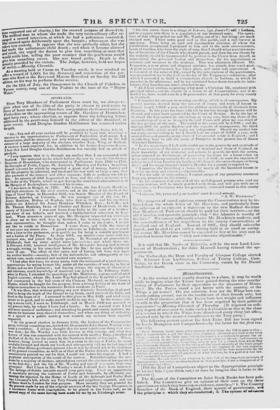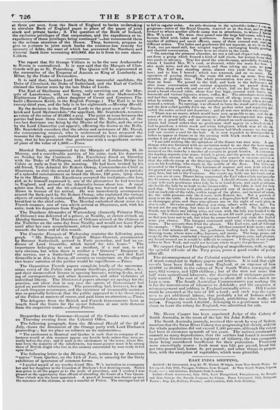" As the session is now rapidly drawing to a
close, it may be worth while to inquire what the Tories have gained during the nine months' sitting of Parliament by their opposition to the measures of Minis- ters? Do the Tories stand a jot better with the country, or the \Vhigs a jot worse? Ott the contrary, trice nut the Whigs been con- stantly yenning ground, not in the confidence of their friends only, but even of their enemies, while the 'Eoi ies have lost weight and influence ex Italy in the proportion that it has been acquired by their political opponents?"—Ilforning Chronicle of Thorsday. [It required no ordi- nary degree of assurance to snake such a declaration as this at the close of a session in which the Whigs have abandoned every thing but office, retained only by the meanest COMplialleeti to the Tory party.] The following protest eft:dust the Irish Tithe Bill has been signed by Lords Brougham and Cumpordown—by the latter for the first rea- sun wily. Fits!, Ilecanae, beside many o: her grounds of oti,stion, the bill is open to this—
that it converts into a gilt the lai. sum originally atls.tneed as a loan to the Irish
elm*, ,eitrary to the faith umlaut .aVelt the country w induced to permit time ad- ,anc, -contrary to the true ai of viler:II lihorty—std contrary to
the spilero co
"ar constitution ; mpeilim: men to ply tar a church from which they coloeiehiloosty akseot, uivin'z to the elel.ry of the s.ua0 minority of the Irish people indeainit■ CIF Ill, loss of 1111'4 81■110111stlq 11111•S At the expense' of the vast majority, and th.tk,ng those who lime broken LIU !AA and withheld nu dues answerable for the condom of such as rein-il payment or %lett the Jae, be it a scut or a bad law, slid umrpeah .t I, is pleserd,..1. itlOrt lo,11 iu this Dail of the impirtant principle or Appropriation, lint rather illkIll,10111111,111 that principle, if out a disapproval of it salostance and diem." L Did the Flail of Catnperdo AM object to the Appropriation principle iu former bills ? (we think not,) or does he imagine that it lurks in the present :1 The Report of the Committee on Joint Stock Banks has been pub- Dolled. The Committee give no opinion of their own on the three questions on which they have taken evidence, namely—" I. The Country branches of the Bank of England, their system of governmeut, and the principles o which they areconducta ; 2. The system of Mums
at three per cent. from the Bank of England to banks undertaking to circulate Bank of England paper in place of the paper of joint stock and private banks ; 3. '1 he question of the Bank of Ireland, the exclusive privileges of that corporation, and the expediency or in. expediency of those privileges being continued "—but recommend them to the serious attention of the House. They, however, propose to give to partners in joint stock banks the common.law remedy for recovery of debts, the want of which has prevented the Northern and Central Bank from recovering 400,0001. due to it from its own share- holders.



























 Previous page
Previous page